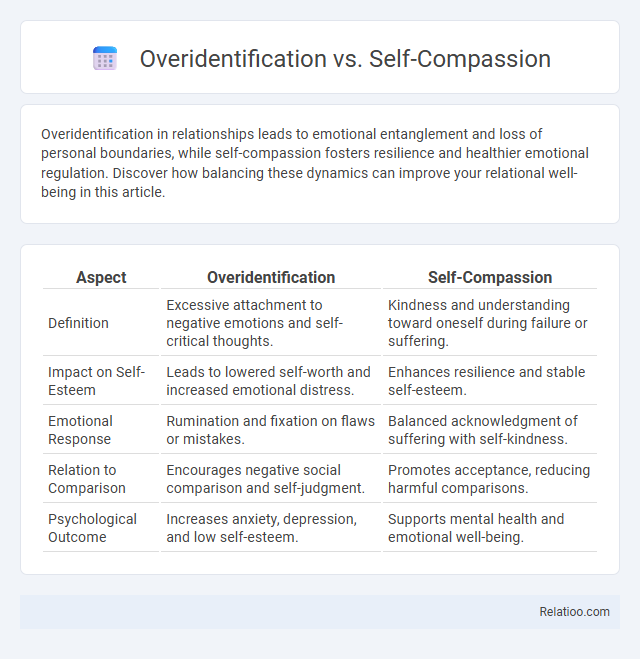Overidentification in relationships leads to emotional entanglement and loss of personal boundaries, while self-compassion fosters resilience and healthier emotional regulation. Discover how balancing these dynamics can improve your relational well-being in this article.
Table of Comparison
| Aspect | Overidentification | Self-Compassion |
|---|---|---|
| Definition | Excessive attachment to negative emotions and self-critical thoughts. | Kindness and understanding toward oneself during failure or suffering. |
| Impact on Self-Esteem | Leads to lowered self-worth and increased emotional distress. | Enhances resilience and stable self-esteem. |
| Emotional Response | Rumination and fixation on flaws or mistakes. | Balanced acknowledgment of suffering with self-kindness. |
| Relation to Comparison | Encourages negative social comparison and self-judgment. | Promotes acceptance, reducing harmful comparisons. |
| Psychological Outcome | Increases anxiety, depression, and low self-esteem. | Supports mental health and emotional well-being. |
Understanding Overidentification: Definition and Signs
Overidentification occurs when individuals excessively merge their identity with negative emotions or experiences, leading to a loss of perspective and increased psychological distress. Signs of overidentification include rumination, self-critical thoughts, and difficulty distinguishing the self from personal struggles. In contrast, self-compassion involves recognizing suffering without judgment, fostering emotional resilience and healthy self-acceptance.
The Core Principles of Self-Compassion
Self-compassion involves treating Yourself with kindness, recognizing common humanity, and maintaining mindful awareness without overidentifying with negative emotions or thoughts. Overidentification occurs when You become entangled in your feelings, amplifying distress rather than observing it with balanced awareness. Embracing self-compassion's core principles fosters emotional resilience by promoting self-kindness, shared human experience, and mindful acceptance.
Overidentification vs Self-Compassion: Key Differences
Overidentification involves obsessively fixating on negative emotions and personal flaws, which amplifies stress and emotional distress, whereas self-compassion entails treating oneself with kindness and understanding during hardship, promoting emotional resilience and well-being. Key differences lie in the emotional response: overidentification leads to rumination and self-criticism, while self-compassion fosters acceptance and balanced self-awareness. Neuroscientific studies highlight reduced activity in the brain's default mode network during self-compassion practices, contrasting with heightened activation during overidentification, underscoring its benefits for mental health.
Psychological Impact of Overidentification
Overidentification, characterized by excessive attachment to negative thoughts and emotions, significantly impacts mental health by intensifying stress, anxiety, and depressive symptoms. Unlike self-compassion, which promotes emotional resilience and self-kindness, overidentification traps individuals in cycles of rumination and self-criticism, impairing their psychological well-being. Therapeutic approaches that reduce overidentification help cultivate mindfulness and emotional regulation, improving overall mental health outcomes.
Benefits of Practicing Self-Compassion
Practicing self-compassion fosters emotional resilience by reducing overidentification with negative thoughts and feelings, allowing you to approach personal setbacks with kindness rather than harsh judgment. This mindful awareness helps maintain a balanced perspective, promoting mental well-being and reducing stress and anxiety. Engaging in self-compassion enhances your ability to cope effectively with challenges without becoming overwhelmed by self-critical narratives.
Common Triggers for Overidentification
Common triggers for overidentification include stress, negative self-talk, and emotional pain, which can cause you to become entangled in your thoughts and feelings. This state contrasts with self-compassion, where you acknowledge your suffering with kindness and maintain perspective without being overwhelmed. Overidentification intensifies emotional reactions, making it difficult to respond adaptively to challenges.
Cultivating Self-Compassion: Practical Strategies
Cultivating self-compassion involves recognizing overidentification with negative thoughts as a barrier to emotional well-being. Practical strategies include mindfulness meditation to observe thoughts without judgment, writing self-compassionate letters to foster kindness towards oneself, and practicing positive self-talk to counteract self-criticism. These techniques enhance emotional resilience by shifting focus from overidentification to a balanced and nurturing perspective on personal experiences.
How Overidentification Sabotages Emotional Well-being
Overidentification occurs when individuals become excessively absorbed in negative emotions, creating a distorted self-view that intensifies stress and anxiety. This mental state undermines emotional well-being by fostering rumination and preventing objective self-reflection, which contrasts with self-compassion's ability to promote emotional resilience and acceptance. Research in mindfulness-based therapies emphasizes that reducing overidentification helps break cycles of emotional distress and enhances psychological health.
Research Insights: The Science of Compassion
Research on overidentification reveals it as a cognitive pattern where individuals excessively fuse with negative emotions, intensifying stress and reducing emotional regulation. Self-compassion, by contrast, involves treating oneself with kindness during hardships, fostering resilience and lowering anxiety through mindful acceptance. Neuroscientific studies show self-compassion activates brain regions linked to emotional balance, while overidentification correlates with heightened activity in areas associated with distress, emphasizing the therapeutic benefits of cultivating self-compassion over overidentification.
Transforming Overidentification into Self-Compassion
Overidentification involves becoming excessively absorbed in negative thoughts and emotions, which can intensify personal suffering and reduce emotional resilience. Transforming overidentification into self-compassion allows you to recognize your struggles without judgment, fostering emotional healing and balanced self-awareness. Practicing self-compassion techniques, such as mindful acknowledgement and kind self-talk, helps break the cycle of overidentification and promotes healthier psychological well-being.

Infographic: Overidentification vs Self-Compassion
 relatioo.com
relatioo.com